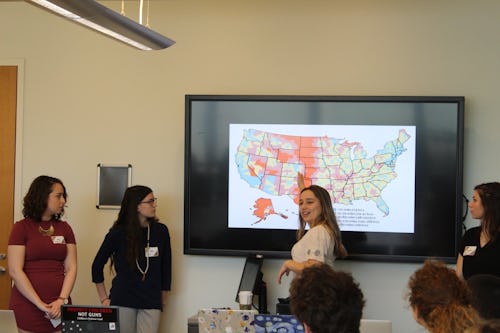
Our Streets is a column by writer and reporter Ray Levy Uyeda that highlights activists, artists, and organizers who are doing the work and reclaiming power for the people.
When students at Hampton University, a historically Black university located in Hampton, Virginia, were forced to transition to online learning due to the pandemic, a change instituted to protect public safety actually jeopardized student health in another way. When people were attending classes in person, Amber Wynne, a senior who runs Hampton’s student emergency reproductive hotline, could easily provide emergency contraception and condoms to students on Hampton’s suburban campus. But after students relocated to off-campus apartments or parents’ homes, the work of distributing critical supplies got more complicated.
In the end, Wynne pivoted without second guessing it. Since the start of lockdown, Wynne has sent nearly 100 packages of emergency contraception and other reproductive care products to students who reached out through the hotline.
“I think there's something very powerful when you are receiving public service that can be a little intimate, that's a little sensitive, from someone who looks like you, who understands your background, whose main focus is to promote wellness,” says Wynne, who is studying health science at Hampton. “I'm not going to ask you the questions that make you feel violated. My biggest concern is just your safety and your well-being.”

Across the country, student organizers are providing critical care to their peers by distributing emergency contraception — “EC” for short. Commonly referred to by its brand name “Plan B,” EC can be difficult to access within university and college settings for a number of reasons, ranging from transportation (suburban and rural campuses tend to be more isolated than those located in cities) to cultural factors (many religious-affiliated academic institutions have rules against the distribution of EC). Cost is also an issue, as even buying EC at a drugstore like CVS can cost about $50.
Enter: Emergency Contraception for Every Campus (EC4EC), a project of American Society for Emergency Contraception (ASEC). EC4EC works with students on college and university campuses to provide access to free emergency contraception through peer-to-peer distribution networks and on-site vending machines. Rather than establishing uniform chapters on campuses, EC4EC offers a safety net to support the unique work students are doing on their own.
Wynne sits on the student advisory committee of EC4EC, along with six other current and former students who work with campus organizers to navigate the barriers to accessing EC. According to Kelly Cleland, ASEC’s executive director, students would reach out to ASEC for support in starting a distribution network on their campuses. But the work was slow because “the students would really, each time, create the process from scratch,” Cleland says, explaining that students would have to look up state laws regarding the distribution of EC, demonstrate demand from the student body to administrators, and locate consistent funding streams for EC.
An opportunity to streamline the process arrived in 2019, with funding from the Tara Health Foundation that allowed ASEC to launch a full-fledged student-oriented program that would provide a blueprint for creating peer-to-peer EC networks or installing EC vending machines by early 2020. Then, in February 2020, ASEC created Emergency Contraception for Every Campus’s Student Advisory Committee to help shape the focus of EC4EC and direct student efforts on the ground. Advisory committee members meet with campus organizers and make sure they have plans for distribution, a team that can execute requests for EC, and a sustainability plan to ensure that the program won’t stop when a student organizer graduates.
Because of changes in the law over the past decade, many of the barriers to accessing EC that remain are cultural and logistical. In 2013, the federal Food and Drug Administration (FDA) approved the over-the-counter sale of Plan B, a safe and effective medication, for all ages, marking a huge step toward opening up access to reproductive care for young people.
Students are a “unique group of people with unique needs.”
But even though pharmacies are legally mandated to offer EC to anyone who asks for it, they are still not required to abide by any standardized distribution procedures. For instance, Rebecca Cohen, an OB-GYN and assistant professor of obstetrics and gynecology and the University of Colorado School of Medicine, tells Mic that physicians are allowed in some states to refuse the sale of Plan B to some people, and that because EC is often stolen — due to its cost and the shame some may feel around having to use it — drug stores are allowed to keep the medication behind lock and key. According to ASEC, 60% of drug stores keep EC on the shelves, meaning that in 40% of stores customers have to ask a pharmacist or clerk for the medication.
“Sometimes they ask you questions about how old you are. If you present as male, they might ask you, why are you buying this? Who is this for? They're not supposed to do any of that,” Cleland explains. Moreover, despite the law against it, ASEC also found that some stores enforce their own age restrictions on purchasing EC, mainly through pharmacists telling customers incorrect information regarding minimum age requirements.
Cohen says these barriers to access are especially devastating for people living in rural areas, those whose sexual identities are marginalized, or folks who may encounter other barriers to health care access, like citizenship status or lack of insurance.
And students, Cohen says, are a “unique group of people with unique needs.” For many, college is the first time they’re living away from home and answering larger questions about their identities, and it’s also a time when little things can fall through the cracks, like remembering to take a daily birth control pill. “So, missing pills from time to time, using condoms inconsistently or incorrectly, or anybody that is sexually active when they're under any kind of substance use” are all circumstances that might lead someone to need EC, Cohen says. By distributing EC directly at dorms and providing vending machines where students can get low-cost EC anonymously and without having to involve insurance companies, EC4EC is trying to make it so that emergency contraception is one less stressor for the maxed-out college kid.
EC4EC’s work is particularly unique on religious campuses, as Lauren Morrissey knows. Before she graduated in May 2020, she ran the peer-to-peer reproductive care network at her Jesuit school, Loyola University Chicago. She was inspired by how students at Georgetown University, also a Jesuit school, addressed the lack of health care access on their campus in Washington, D.C. In 2018, Georgetown’s reproductive care and pro-choice organization established a peer-to-peer network for EC distribution.
Both schools are a part of Student Coalition for Reproductive Justice, an umbrella organization that coordinates reproductive care access on religious universities. Morrissey figured if Georgetown students could bring EC access to their Jesuit campus, she could do the same for Loyola University Chicago.
“Students don’t waive their rights to sexual and reproductive health care as soon as they set foot on a religious campus,” Morrissey says. The Catholic Church believes that contraception is “intrinsically evil,” she says, but “college students have sex. That is a fact of college life for most people.”
Morrissey was angry at the fact that her school didn’t make condoms, birth control pills, or HIV-prevention medication available to students. She was already working with an existing campus group, Students for Reproductive Justice (a Loyola-specific organization that is separate from the larger Student Coalition for Reproductive Justice), to change this. Through her work with SRJ, though, Morrissey knew that putting an EC vending machine on campus was out of the question because it would require the administration’s support. So in 2019, she connected with ASEC, which has provided legal support to her and the students who joined her cause for the past two years.

Morrissey was hoping that establishing a peer-to-peer distribution network could work on her campus, because it didn’t require any involvement or even awareness on the part of the university. At the time, her biggest concern was being attacked by the administration or facing potential retribution, like having her scholarship revoked. But ASEC’s lawyers informed Morrissey there was nothing illegal about wanting to provide condoms and emergency contraception to her peers.
After two years of planning, SRJ will at last begin providing direct access to EC at Loyola University Chicago this year. Students can fill out a Google form to request the products and volunteers with SRJ will put them in a brown paper bag that they’ll later drop off at the requested location.
Even on campuses in liberal states like California, student organizers have run up against cultural barriers to reproductive health care access. When Parteek Singh was an undergraduate student at the University of California at Davis, he navigated a two-year battle with administrators to install what he says was the first EC vending machine at a public university.
When he first began the push in 2017, Singh tells Mic, the pharmacist on campus “didn’t agree with the project” and told him that it was illegal to sell EC in a vending machine and without some sort of adult or guardian supervision. Singh refuted that claim by pointing out that it wasn’t illegal. In fact, students at Pomona, a small private university in Southern California, had already put in an EC vending machine of their own.
Singh believes “the taboo concept of sexual health” played a role in the administration’s pushback. Through meetings with campus groups, administrators, and the anti-reproductive health care group on campus, Singh learned that the effort would be more successful if the student government rebranded the idea. Instead of calling it an “EC vending machine,” Singh and his fellow organizers said they wanted to get a “wellness machine” set up that would provide things like Advil and menstrual products as well. It was eventually installed in 2017.
Singh has since graduated and moved to New York. But his experience illustrates how student organizers learn from each others’ wins. The UC Davis EC vending machine received widespread media coverage, and after that Singh says that students on other campuses, including nearby Stanford University, reached out to ask how he’d gotten it done. College students even changed the law in Maine in 2019 to eliminate previous legislation that barred its sale though vending machines.
With students back on campuses this year, there’s ample opportunity to increase the scope of the work that EC4EC is doing. “I think sometimes, when you’re doing activism work, it’s not always clear what the result is. But in this case, it's really tangible,” Cleland says. The ultimate goal, she says, is right there in the name.







